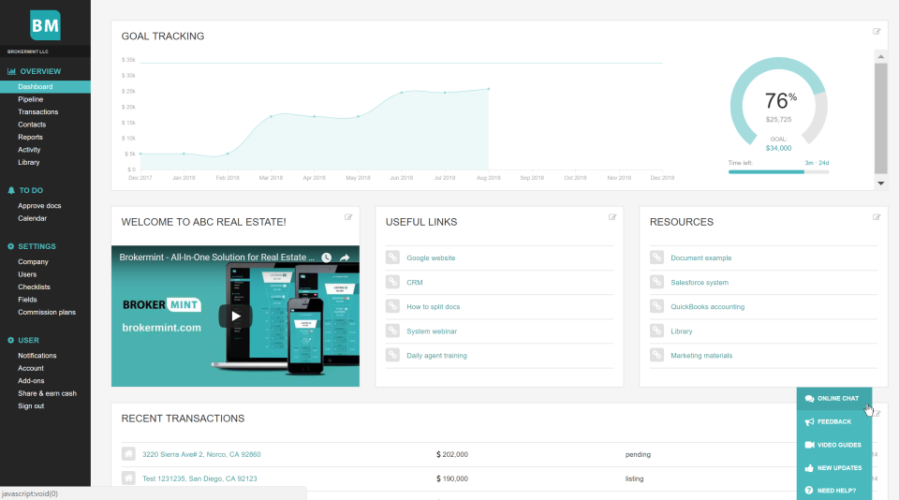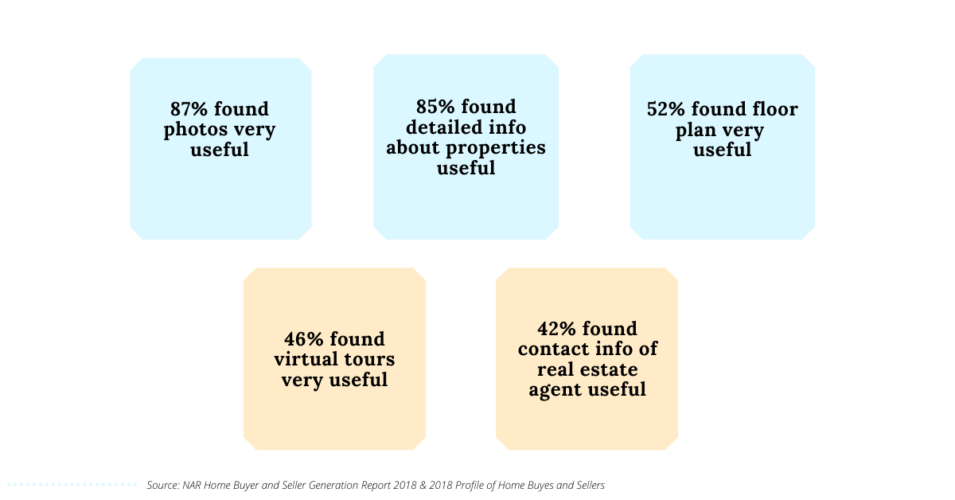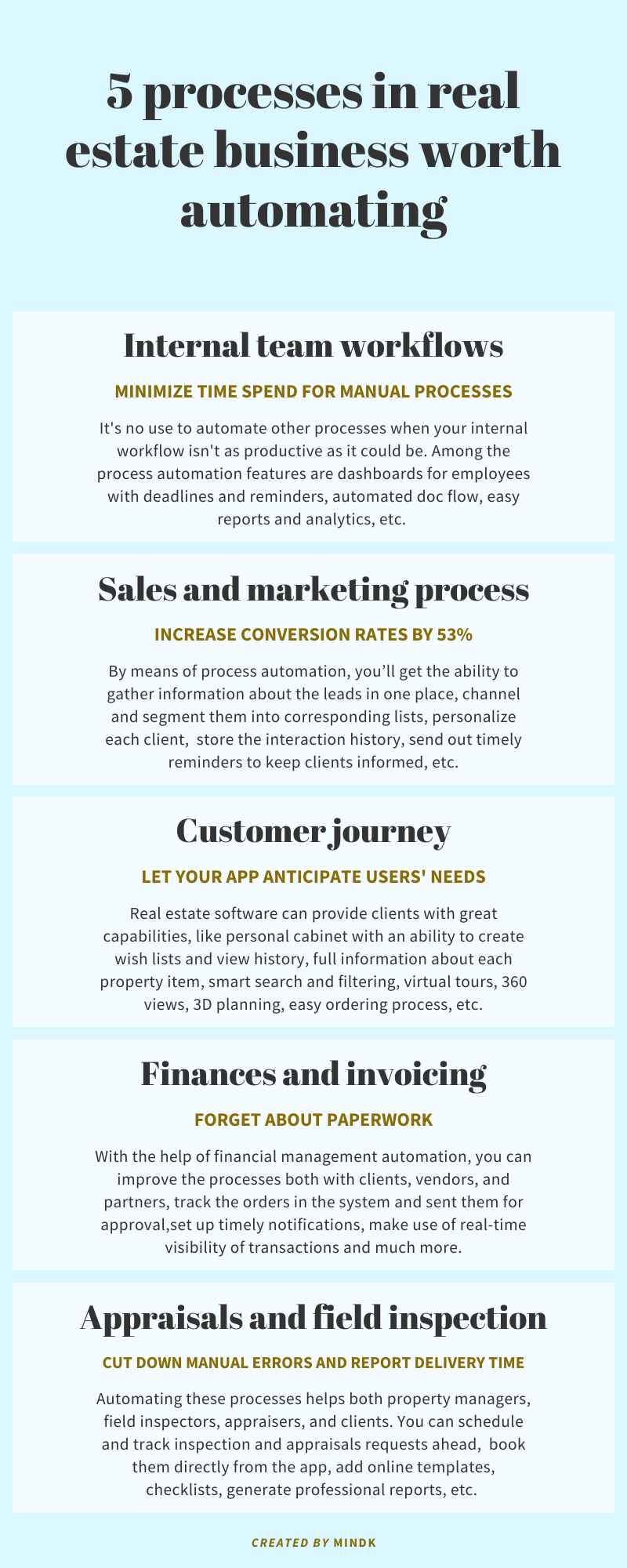The tech boom innovations have had a far-reaching effect on the world, more so on business. Rules that worked several years ago may not produce the desired results today. The real estate business is just one of many forced to adapt.
Last year, 51% of buyers found their home online. This number will definitely grow each year. Customers will continue to take advantage of the technology available to them and choose real estate companies that provide easy access to it.
48% of firms admit that keeping up with technology is among their biggest challenges.
In conditions such as this, business process automation seems like a necessary step, not an optional choice. The companies who recognize the pressing need for digitalization and develop custom real estate systems have a greater competitive advantage in the market.
Small wonder, as workflow automation reduces time spent on routine processes, releases resources for high-value tasks, and reaches more customers by providing excellent “hot and happening” services, plus it keeps you ahead of the market and competition.
90% of survey respondents observe improvements in portfolio expansion, revenue, and efficiency thanks to property management software.
The first step on the way toward real estate automation is actually figuring out what processes should be automated.
Below we have collected a number of business processes you need to automate in the nearest future. We also introduce an example of how we automate the business processes of our clients with developing custom property management app.
Double the productivity of your real estate business with process automation
#1: Internal team workflows
In case your real estate business runs like “in the good old days,” your property managers likely spend half or more of their working time on manual processes: completing and filing real estate documents, coordinating meetings and appointments, emails, monthly and annual operations, managing client databases and so on.
There’s no sense in automating other processes if your internal workflow isn’t as productive as it should be. For instance, you can automate the sales and marketing processes, but your team won’t be able to handle the increasing consumer traffic.
The variety of internal processes that could be automated is huge and directly depends on the niche and specifics of your work. Here are only a few business process automation examples:
- ability to manage tasks inside the company: setting tasks with deadlines and reminders, organizing tasks by contact and workflow, sharing tasks with other team members.
- dashboard for each employee: always keep your eye on the ball, complete tasks faster and track personal KPI on a daily basis.
- calendar and/or integrations of your software with Google Calendar, Outlook or iCalendar, in order to sync appointments with the client calendars. It helps you plan the dates and find a time that suits everyone.
- automated document flow and the ability to access important documents remotely. Legal documents, licenses, agreements, subcontractor agreements, assessment papers, sales deeds require special confidentiality. Real estate software helps manage and access the information like property items, age, location details, floorplans, title deeds, etc. from anywhere and anytime.
- easy reports and analytics: measuring and analyzing is crucial to identify whether the business is on the right track. It allows you to find the areas of concern and make calculated moves for the sake of your business.

#2: Sales and marketing process
Considering the fact that the real estate business, as a rule, involves a long sales cycle, manually managing client databases and processing every potential client in time is a great challenge for real estate agents.
Although you can’t close real estate deals without actually speaking to the client, there is a heap of processes that can and should be automated.
According to Aberdeen Research, automation of marketing processes is believed to increase conversion rates by up to 53%.
By means of process automation, you’ll get the ability to:
- gather information about leads in one place — the more leads you have in the sales funnel, the more potential there is for sales and conversion;
- channel and segment them into corresponding lists;
- personalize each client and store the interaction history;
- create a buyer persona based on tracking the online engagement of the person and design targeted emails and marketing messages;
- send out timely reminders to keep clients informed and provide more opportunities to increase engagement etc;
- immediately respond to messages from prospective buyers;
create customized marketing campaigns, etc.
The possibilities are huge. Analyze your sales and marketing strategy and you will definitely see the place to improve it!
#3: Customer journey
81% of clients start their shopping with research on the Internet. The competition there is high (only 5% of real estate firms have no web site), as it turns out that providing good user experience goes beyond just having a nice interface.
Users want interactions with a real estate app to be seamless and engaging. They want the app to anticipate and satisfy their needs. Automation should definitely take it into account.
If we take renting as an example, 55% of millennial tenants want to submit rental applications online.
That is why the customer journey should be based on understanding the physical and emotional state of your potential user (i.e. their concerns).
Real estate software can provide clients with greater capabilities, like:
- personal cabinet with an ability to create wish lists, see view history, etc.;
- exhaustive information about each property item with photos and descriptions (80% of clients decide whether to buy the property based on the images displayed);
- smart search and filtering;
- interactive map view of property items;
- virtual tours, 360 views, 3D planning, etc.;
- easy ordering process and ability to choose the appointments online;
virtualization of user journey; - real-time messaging with property managers and/or owners without a need to have a personal contact from the very beginning and so on.
Customer experience powered by technology brings more collaboration, improved information flows and a rise in the efficiency of the real estate business.
#4: Finances and invoicing
Let’s face it, it’s impossible to scale for growth with manual invoicing and payment processes. Processing every invoice and payment manually leads to a waste of valuable time that your company cannot reclaim.
Automation by creating a centralized system can enable end-to-end reviewing, managing and streamlining of the whole payment process (no paperwork).
With the help of financial management automation, you can:
- improve the processes both with clients, vendors, and partners;
- track orders in the system and send them for approval;
- set up timely notifications;
- make use of real-time visibility of transactions.
and much more!
#5: Real estate appraisals and field inspection
Inspecting the home quality reveals critical information about the condition of the home and its systems, while appraisal helps to determine the best price for a property item.
An improper quality check or incorrect appraisal may cause the client to cancel the deal.
Planning inspections and appraisals, collecting data, taking pictures for analyzing and creating reports and certificates are crucial but time-consuming processes in most real estate companies. Automating these processes helps both property managers, field inspectors, appraisers, and clients!
Here are a few examples of how the automation process may ease your pain:
- schedule and track inspection and appraisals requests ahead;
- give an opportunity to clients or employees to book them directly from the app;
- let the system match appropriate appraisers and field inspectors with the orders;
- add online templates, checklists, easy image upload possibilities;
- make possible to generate professional reports, edit and share them with required people.
By automating appraisal and field inspections you can cut down on manual errors and report delivery time without compromise to quality and reliability.
The best way to embrace automation
As you know, demand breeds supply. The evolving technological needs of real estate and other industries gave rise to a number of tools for each and every process, like email marketing, appointment setting, and so on.
Unfortunately, the mass-market systems lack the better part of features that real estate business needs, while dedicated real estate apps may not suit your niche. Moreover, trying to automate your business with dozens of unrelated tools may result in even more effort.
If the out-of-the-box solution does not supply at least 80% of your needs, look to the possibility of developing your own custom system.
The MindK team has created various solutions for clients from construction and real estate business, like custom professional web portals, SaaS application, CRM, sales tools, etc.
If you want to find out more about our expertise, don’t hesitate to contact us. We are happy to help with your challenges and apply our knowledge and expertise to streamline your business.









